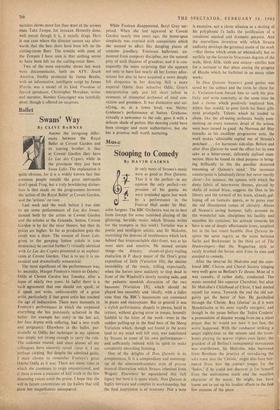Music
Stooping to Comedy
By DAVID CAIRNS
IF only more of Strauss's music were as good as Don Quixote. That it is the perfect—in my opinion the only perfect—ex- pression of his genius we were reminded again last week by a performance in the Festival Hall under Sir Mal- colm Sargent. The BBC Orchestra was on its best form (except for some tarnished playing of the glittering, heraldic.-music which Strauss writes for the trumpets in this work), Tortelier was a poetic and intelligent soloist, and Sir Malcolm, exorcising the demons of tastelessness which lurk behind that irreproachable shirt-front, was at his most alert and sensitive. He missed certain things—the dreamy, clouds-of-glory-trailing exaltation in F sharp major of the Don's great exposition of faith (Variation Ill), the sinister immobility of the music, trilling expectantly, when the horses seem suddenly to stop dead in front of the Windmill's slowly turning sails, and the pedantic monkish discussion of the two bassoons (Variation IX),. which should be played less smoothly and, ideally, with a fuller tone than the BBC's bassoonists can command in piano and mezzopiano But in general it was a stylish performance, shapely in phrase, lucid in texture, without glaring error in tempo, honestly faithful to the letter of the work—even in the sudden pulling-up in the final bars of the Sheep Variation which, though not found in the score (and to my mind well left out), was sanctioned by Strauss in some of his own performances— and sufficiently imbued with its spirit to make completely absorbing listening.
One of the delights of Don Quixote is its completeness. It is a compendium and summing- up of the nineteenth-century style of precise musical illustration which Strauss inherited from Wagner. Elsewhere he squandered this rich legacy but here it is spent wisely. Don Quixote is highly intricate and complex in workmanship, but the final impression is of economy. Not a note is excessive, not a clever allusion or a dotting of his polyphonic i's lacks the justification of a consistent musical and dramatic purpose. And the marvellous invention with which Strauss endlessly develops the germinal motiv of the work —that theme which struts so whimsically but so earthily up the favourite Straussian degrees of the scale, third, fifth, sixth and octave—entitles him for a moment to that place among the progeny of Haydn which he forfeited in so many other works.
In Don Quixote Strauss's good genius was saved by the subject and the form he chose for it. Variation-form forced him to curb his pro- lixity and write concisely; at the same time he had a theme which positively implored him, within that mould, to pour forth his finest gifts most prodigally. Talents which he tended to abuse, like the all-seeing orchestra busily com- menting on every minutest detail of the action, were here turned to good As Norman del Mar remarks in his excellent programme note, the work makes 'admirable capital out of Strauss's penchant ... for harmonic side-slips. Before and after Don Quixote he used the effect for its own sake as a bitter-sweet, delicately stylised man- nerism. Here he found its ideal purpose in bring- ing brilliantly to life the peculiar distorted reasoning of Quixote's mind.' The incessant counterpoint is fabulously clever but never merely clever—for instance, the aptness with which the dusty fabric of interwoven themes, pierced by shafts of muted brass, suggests the Don in his library and the turmoil of his brain, already gal- loping off on fantastic quests, as he pores over the old illuminated tomes of chivalry. Above all Strauss's saving humour, fully aroused by the wonderful tale, disciplines his facility and ennobles his cynicism; his attitude towards his hero is one of deeply affectionate irony, sceptical but in the last resort humble. Don Quixote in- spires the same regrets as the scene between Sachs and Beckmesser in the third act of The Mastersingers----that the Wagnerian style so rarely brushed the heroic mist froin its eyes and stooped to comedy.
After the interval Sir Malcolm and the com- bined BBC Chorus and Choral Society (singing very well) gave us Berlioz's Te Deum. Most of it was soundly, if rather dully, conducted. The music sounded like superior Cherubini; but after Sir Malcolm's Childhood of Christ, 1 had steeled myself for worse. Towards the end the old vul- garity got the better of him. He gambolled through the `Christe, Rex Gloriae' as if it were Mendelssohn at his most vapidly energetic; and though in the pause before the 'Judex Crederis' a premonition of disaster wrung from me a silent prayer that he would not take it too fast, the worst happened. With the conductor striking a smart eighty-four to the minute and the trom- bones playing the quaver triplets even faster, the grandest of all Berlioz's monumental movements was overthrown. Sir Malcolm, who borrowed from Beecham the practice of introducing the solo tenor into the `Christe,' might also have bor- rowed from him the correct tempo for the . 'Judex,' if he could not discover it for himself from the metronome mark and the manifest character of the music. He might, too, have learnt not to use up his loudest'effects in the first few minutes of the piece.

































 Previous page
Previous page